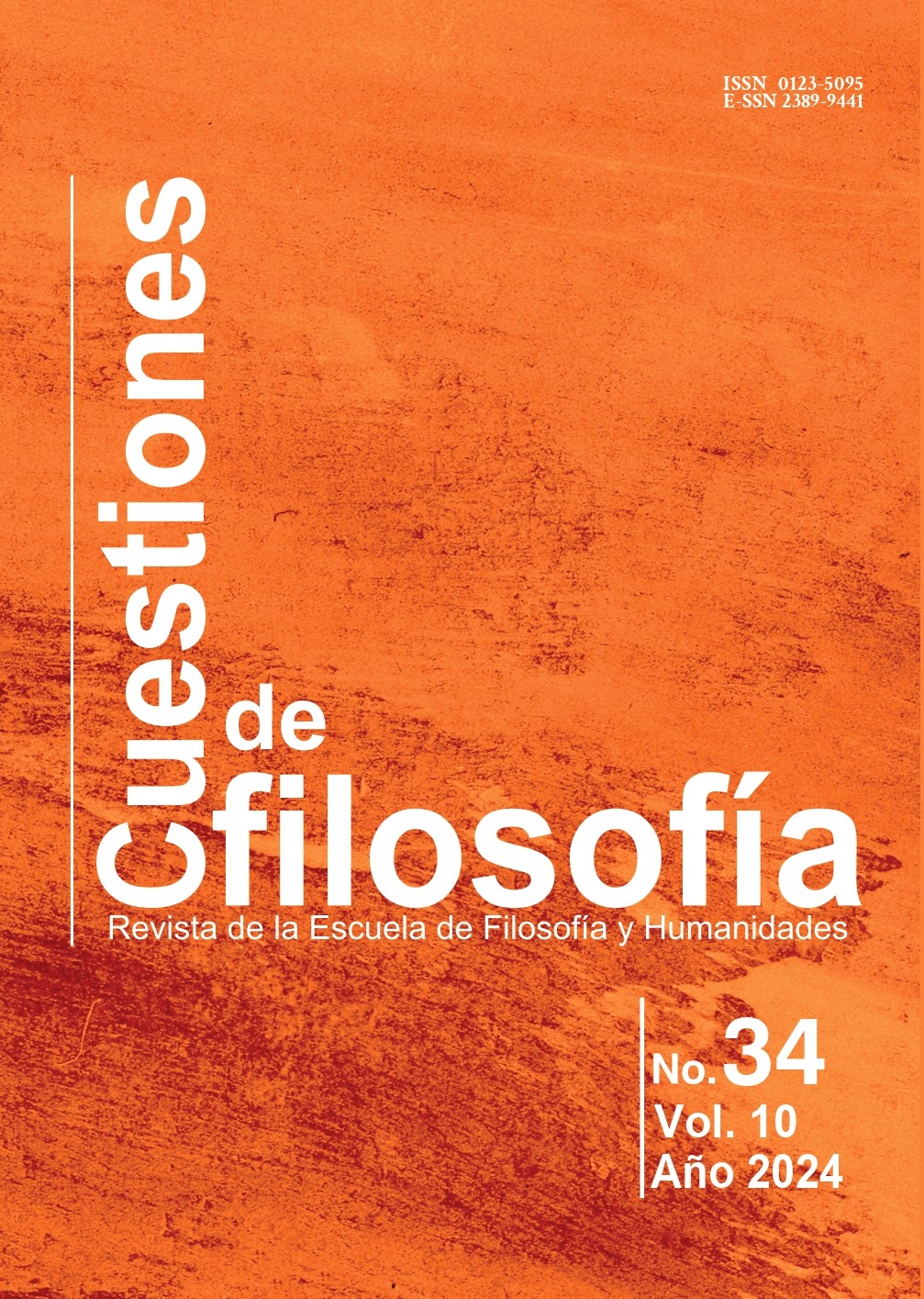Volo ut sis: A reflection on love and authenticity through four scenes

Abstract
This paper suggests a correlation between Pindar’s exhortation on becoming who one is –interpreted here as authenticity–, and the phenomenon of love in the context of the existential analysis of Dasein in Being and Time. Following what Heidegger himself argues decades later in the Zollikon Seminars: Care, correctly understood, is not different from love. In order to ground the proposed reading of love in its key of authenticity, we will examine four scenes: Pindar, Nietzsche, St. Augustine and Heidegger. This “mise-en-scène” seeks to highlight and clarify the mutual belonging between authenticity and love, thus suggesting that any philosophical development that intends to make a systematic analysis of love must necessarily take into account the will that we find in lovers for their beloved to become who he or she truly is. At the same time, this prerogative has ontological implications that should not be left unnoticed, both for our interpretation of ourselves, and for the problem of the aforementioned prerogative regarding the transit that takes place between being and not-being –or between not-yet-being and be-coming. This suggests –without getting carried away by classical metaphysical distinctions, such as those of potency and act– a particular mode of unhiding, and a particular mode of ποίησις.
Keywords
authenticity, becoming the-one-who-one-is, care, love, Heidegger
References
- Acevedo, J. (1984). Hombre y Mundo. Santiago de Chile: Universitaria.
- Acevedo, J. (1985). Sobre el “problema” del conocimiento en Heidegger. Revista de Filosofía, 25-26, pp. 85-100. https://revistafilosofia.uchile.cl/index.php/RDF/article/view/44898
- Acevedo, J. (1999). Heidegger y la época técnica. Santiago de Chile: Universitaria.
- Acevedo, J. (2014). Heidegger: Existir en la era técnica. Santiago de Chile:Universidad Diego Portales.
- Adrián, J. (2021). Glosario terminológico comentado. La pregunta por la técnica (pp. 3-22). Barcelona: Herder.
- Arjakovsky, P., Fédier, F. et France-Lanord, F. (Eds.). (2013). Le Dictionnaire Martin Heidegger. Vocabulaire polyphonique de sa pensé. Paris: Éditions du Cerf.
- Fédier, F. (2022). Pensar desde el arte. Heidegger, Cézanne, Matisse, Hölderlin (J. Acevedo, Trad.). Santiago de Chile: Universitaria.
- Gass, W. (2012). Nietzsche in Illness and in Health. Life Sentences (pp. 63-92). New York: Alfred A Knopf.
- Glare, P. G. W. (Ed.). (1983). Oxford Latin Dictionary. Oxford: Oxford University Press.
- Heidegger, M. (2000a) Correspondencia (1925-1975) (A. Kovacsics, Trad.). Barcelona: Herder.
- Heidegger, M. (2000b). Los problemas fundamentales de la Fenomenología (J. García Norro, Trad.). Madrid: Trotta.
- Heidegger, M. (2001a). Introducción a la filosofía (M. Jiménez Redondo, Trad.). Madrid: Cátedra.
- Heidegger, M. (2001b). Introducción a la metafísica (A. Ackermann, Trad.). Barcelona: Gedisa.
- Heidegger, M. (2003). Estudios de mística medieval (J. Muñoz, Trad.). México: Fondo de Cultura Económica.
- Heidegger, M. (2005a). Ser y tiempo (J. Eduardo Rivera, Trad.). Santiago de Chile: Universitaria.
- Heidegger, M. (2005b). Aclaraciones a la poesía de Hölderlin (H. Cortés y A. Leyte, Trads.). Madrid: Alianza.
- Heidegger, M. (2006a). Carta sobre el humanismo (H. Cortés y A. Leyte, Trad.). Madrid: Alianza.
- Heidegger, M. (2006b). Prolegómenos para una historia del concepto de tiempo (J. Aspiunza, Trad.). Madrid: Alianza.
- Heidegger, M. (2007a). Filosofía, Ciencia y Técnica (J. Acevedo Guerra, Trad.). Santiago de Chile: Universitaria.
- Heidegger, M. (2007b). Seminarios de Zollikon (Á. Xolocotzi Yánez, Trad.). México: Red Utopía Asociación Civil A.C.
- Heidegger, M. (2010). Caminos del bosque (H. Cortés y A. Leyte, Trad.). Madrid: Alianza.
- Heidegger, M. (2021). La pregunta por la técnica (J. Adrián Escudero, Trad.). Barcelona: Herder.
- Hemelsoet, D., Hemelsoet, K. and Devreese, D. (2008). The neurological illness of Friedrich Nietzsche. Acta Neurol Belg, 108 (1), pp. 9-16. https://pubmed.ncbi.nlm.nih.gov/18575181/
- Janz, C. P. (1985). Friedrich Nietzsche. 4. Los años de hundimiento (J. Muñoz y I. Reguera, Trads.). Madrid: Alianza.
- Kaufmann, W. (1954). The Portable Nietzsche. New York: The Viking Press.
- Nietzsche, F. (1990). La Ciencia Jovial. “La Gaya Scienza” (J. Jara, Trad.). Caracas: Monte Ávila Editores.
- Nietzsche, F. (2003). Así habló Zaratustra (A. Sánchez Pascual, Trad.). Madrid: Alianza.
- Nietzsche, F. (2005). Ecce Homo (A. Sánchez Pascual, Trad.). Madrid: Alianza.
- Nietzsche, F. (2008). Fragmentos Póstumos. Volumen II (1875-1882) (M. Barrios y J. Aspiunza, Trads.). Madrid: Tecnos.
- Nietzsche, F. (2010). Correspondencia. Volumen IV (enero 1880 – diciembre 1884) (L. E. de Santiago Guervós, Trad.). Madrid: Trotta.
- Oyarzun, P. (2000). Lo Trágico, de Hölderlin a Nietzsche. Revista de Filosofía, 50, pp. 137-156. https://revistafilosofia.uchile.cl/index.php/RDF/article/view/44133
- Píndaro. (1984). Odas y Fragmentos (A. Ortega, Trad.). Madrid: Gredos.
- Platón. (1988). El Banquete. Diálogos III (M. García, M., Martínez y E. Lledó, Trads.). Madrid: Gredos.
- San Agustín. (1959). Obras completas. Volumen XVIII. B. Martin Pérez (Ed.). Madrid: Biblioteca de Autores Cristianos.
- Shakespeare, W. (2004). Romeo and Juliet. The Annotated Shakespeare. B. Raffel and H. Bloom (Eds.). New Haven: Yale University Press.